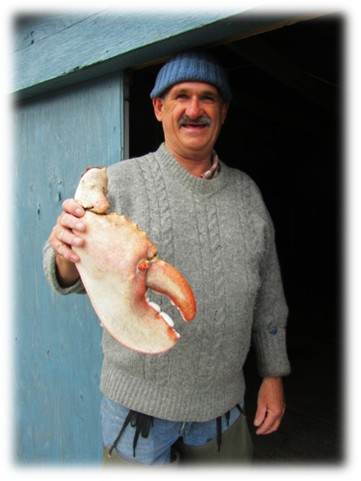This article was originally posted on the Ecology Action Centre's fisheries blog Small Scales. Guest author of this post is Kristen Lowitt, who also sits on the FSN Board of Directors.
I came to Newfoundland for the first time just over four years ago. I can still vividly recall taking the ferry across from Nova Scotia in the late winter, listening to the groaning sounds of the ice around the boat. Within two months of arriving I made my first trip to Bonne Bay, a remote fjord on the west coast of the island. I went to learn about the food system and fisheries in the region as part of a PhD program I was beginning at Memorial University that fall.
I was lucky to be welcomed by many people, and in particular Brenda, who took me under her wing and made it her quest to introduce me to all things Newfoundland. On one of my early visits she took me to a dinner of “traditional” Newfoundland foods, from cod tongues and grilled salmon to Purity Jam Jams and Pineapple Crush (apparently a flavor available only on the island). I’ve made many trips back since then, and have come to understand a bit better the history of these communities and some of the changes in ways of accessing and eating food.
My radio documentary “As We Fish and Farm” looks at the changing face of fishing and farming around Bonne Bay. It features Ernie Decker, Marsha Crocker, and Mancel Halfyard, who have over one hundred years collective experience fishing and farming in this region. Speaking about how they got started, why they continue today, and some of their challenges, each express their hope for a vibrant future for their communities where fishing and farming continues to be vital.
Bonne Bay’s early settlers had to become hunters, trappers, fish killers, and gardeners to survive. Until the mid-twentieth century fishing was undertaken by households in a seasonal, resource-based cycle of food provisioning. Starting in the 1950s, the fishery transitioned from mainly small-scale production to more industrial and commercial production by the 1980s. This was accompanied by a shift in fish processing away from the household and into fish plants. Traditional ways of accessing food also changed more quickly following Newfoundland’s Confederation with Canada in 1949, as cash become more available and there was an influx of imported foods.
Community life has changed very rapidly in many coastal communities throughout Newfoundland and Labrador, including Bonne Bay, particularly since the collapse of cod and other groundfish stocks in the early 1990s. At that time, almost all cod and other groundfish fisheries were placed under moratoria because of severe resource declines.
Nearly twenty years after the moratorium the cod stocks have not rebuilt. A shift to shellfish harvesting and processing has not fully compensated for the lost income from groundfisheries, particularly for small-scale fish harvesters and processing workers. Ongoing policy attention centers on rationalizing the fishing industry by eliminating more fish harvesters and processing plants, and in particular small-scale inshore fleets and small processing plants in more rural parts of the province.
Meanwhile, communities continue to face high rates of out-migration, particularly among young people. Dwindling recruitment of young people to the fishing industry is a key challenge facing the viability of independent fishing enterprises, and the future of coastal communities.
Despite these challenges, fishing remains an important source of employment in Bonne Bay. According to Newfoundland and Labrador Community Accounts, about 17% of the workforce in Bonne Bay was employed in the industry in 2005, including 195 people in fish harvesting and 70 in fish processing. Four processing plants are still active in the region.
“As We Fish and Farm” explores how these changes to the fishing industry, to the food system, and to communities, are understood by Ernie, Marsha, and Mancel. Along with his brother, Ernie Decker has fished for nearly forty years out of Baker’s Brook, where his father fished before him. Lynn, who was a crewmember with Ernie’s enterprise said, “when you’re fishing so long in a certain area you know your ground.” Marsha Crocker lives with her husband and two young sons in Trout River where they tend animals and run a commercial fishing enterprise. Mancel Halfyard, nearly 90 years old, continues to garden the same plot of land he has tended for over fifty years in Woody Point.
This documentary is their stories about change, about struggle, and, perhaps most importantly, about optimism and their visions for the future. As rural and coastal communities continue to change and face new challenges, the continuance of small-scale fishing and farming will be a vital part of a resilient local food system that may support livelihood opportunities and community well-being into the future. Meanwhile, I continue to return, and enjoy dinners of fish and brewis and Jam Jams for dessert.
Listen to the documentary here.
This documentary was put together by Kristen Lowitt as part of her doctoral research at Memorial University, where she is exploring the relationship between changes to fisheries and the food security of communities around Bonne Bay. Kristen would also like to acknowledge the CURRA research project and a SSHRC Outreach Grant in supporting this project.






